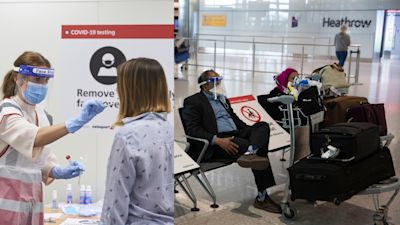Travellers told to 'weigh up' additional cost of Covid test to cut England quarantine

Video report by ITV News Correspondent Richard Pallot
Travellers will be able to reduce their quarantine from 14 days if they test negative for coronavirus - but it will have to be paid for privately.
Transport Secretary Grant Shapps announced overseas travellers would only have to quarantine for five days after arriving back in England, should they record a negative test result after five days.
Mr Shapps said travellers will need to pay a fee if they want to use the new tests because going abroad is "usually a discretionary activity".
Here's how the new quarantine rules work:
Under the new rules, passengers arriving back in England from December 15 from a country not on the government's travel corridor will still need to enter self-isolation.
The cost of the test, from a private firm, will add another £65 to £120 on to your travel costs.
PM urges Britons to be ‘jolly careful’ as UK leaders devise Christmas plan
Covid tiers: Non-essential shops, gyms and hairdressers to reopen when lockdown ends on December 2
Results are typically issued within 24-48 hours, meaning people will likely be released from quarantine six days after arrival.
The change does not apply to people arriving in Northern Ireland, Scotland or Wales, who must continue to self-isolate for 14 days.
Mr Shapps said: “We have a plan in place to ensure that our route out of this pandemic is careful and balanced, allowing us to focus on what we can now do to bolster international travel while keeping the public safe.
“Our new testing strategy will allow us to travel more freely, see loved ones and drive international business. By giving people the choice to test on day five, we are also supporting the travel industry as it continues to rebuild out of the pandemic.”
He said he was confident people have been complying with the 14 day travel quarantine but said he recognised 14 days was "a long time for people to quarantine or self-isolate".
Mr Shapps confirmed to ITV's Good Morning Britain that those who can not pay for the test will still have to quarantine for the full period, telling ITV News the government's testing priority was key workers.
He told ITV News, people would have to "weigh up" the additional cost of the test if they want to be released from self-isolation early.
"First of all, I wanted to make sure when we introduced this that we're not taking any tests away from the NHS - those doctors and nurses and teachers who need to be able to carry on working. "So I've required this to be a private test that you have to get to a specific standard, which the Chief Medical Officer will specify. And the tests ranges from £65 - £120, we suspect they'll come down over a period of time," he said.
Mr Shapps told Good Morning Britain: "One of the things that we know is that if you provide a practical alternative to people, people generally want to do the right thing.
“You’ve got to give them the option to be able to do the right thing, and being able to take a test means that as soon as you have a negative result, you’re able to be released."
Health Secretary Matt Hancock said: “This test on day five of the 14-day self-isolation period will identify positive coronavirus cases and allow those who test negative to return to work and see their loved ones while abiding by domestic coronavirus restrictions.
“This will be done at the cost of the traveller to protect the capacity of NHS Test and Trace and ensure that any UK resident who has symptoms is able to get a test.”
The policy change has been largely welcomed by the travel and holiday industry, which has been particularly hard hit by the pandemic.
Tim Alderslade, chief executive of Airlines UK, the industry association representing UK-registered carriers, said the announcement provided “light at the end of the tunnel” for the aviation industry and people wanting to go on holiday.
He predicted demand for air travel will “tentatively return” following the decision but said a pre-departure or domestic testing regime that can completely remove the need to self-isolate is “the only way we’re going to comprehensively reopen the market”.
Mark Tanzer, chief executive of travel trade organisation Abta, commented: “The test to release scheme in England should help to make overseas travel more attractive and manageable for both holidaymakers and business travellers."
But Ryanair boss Michael O'Leary questioned plans to allow travellers arriving in England to end their Covid-19 quarantine early if get a negative coronavirus test five days after arrival, telling ITV News he believed the government had not "thought this through particularly well".
"We think what Ryanair is advocating, which is a pre-departure Covid test - everyone who travels should get a negative test within 72-hours, three days before departure - is a much better system.
"It allows families to travel for Christmas knowing they're Covid negative, but also they don't have to quarantine on arrival and there's no need for them to quarantine because they're Covid negative. "
The government also announced it will introduce new financial support for English airports and ground handling firms in the new year.
The support will cover business rates liabilities up to £8 million at each site.
Chancellor Rishi Sunak said: “The aviation industry is vital to our economy – creating jobs and driving growth- which is why we have supported them throughout this crisis through the job retention scheme, loans and tax deferrals.
“This new package of support for airports, alongside a new testing regime for international arrivals, will help the sector take off once again as we build back better from the pandemic.”